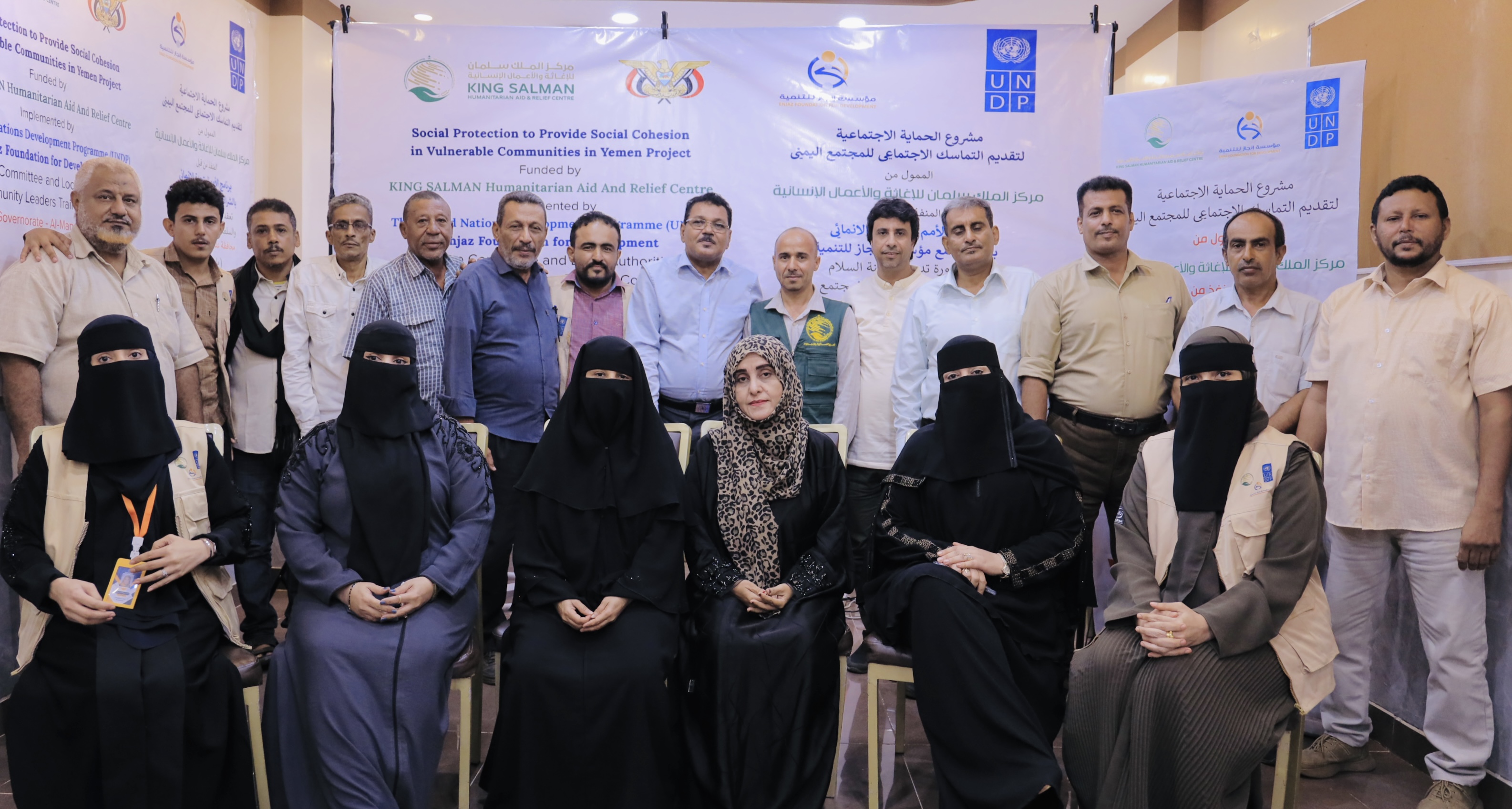Building Trust and Resolving Community Issues: The Impact of Peace Committees in Yemen
August 21, 2024

Peace Committee Training, Tareem District in Hadramaut
Ensuring communities are well equipped to resolve problems is key to a healthy and peaceful environment. UNDP Yemen’s Social Protection to Provide Social Cohesion in Vulnerable Communities in Yemen Project, generously funded by the King Salman Humanitarian Aid and Relief Centre, is playing a pivotal role in fortifying peace committees by providing them with community-based isssues resolution tools and resources. This strategic initiative aims to bolster the capacity of the members of peace committees in targeted governorates in Yemen to effectively address community development related issues, promoting harmony and stability amidst challenging circumstances.
By equipping six peace committees in Aden (Al-Mansoura and Sheikh Otman), Hadramaut (Seiyun and Tareem) and Lahj (Tooralbaha and Alhota) with the necessary skills and support, we are not only enhancing their effectiveness but also fostering a culture of dialogue, co-existence, and encouraging community-based advocacy to resolving community-based issues across Yemen.

Peace Committee Training in Aden in Al-Mansoura District
Rana, a community representative on the Peace Committee in Al-Mansoura, says, "Previously, many individuals attempted to resolve community issues without success. However, the establishment of peace committees has changed that. These committees include members from diverse fields, including local and community authorities, which greatly facilitates community related problem-solving. The presence of experienced individuals within these committees ensures a better understanding of issues and effective interventions, leading to resolutions without escalation."
Abdullah, a community representative on the Peace Committee in Al-Mansoura, echoes this sentiment, emphasizing that the collaboration between local authorities and community leaders, "strengthens their relationship, making them partners in addressing community issues and helping to align their perspectives and objectives."
Naguib, representative of Al-Muhamasheen (marginalized) community in Aden, Al-Mansoura District, underscores the significance of having a Muhamasheen representative on peace committees. He states, "It ensures that the interests of all affected individuals are heard and represented fairly and equitably. It also builds trust and enhances cooperation, reflecting respect and recognition of everyone's rights." Naguib added that his participation on the Peace Committee has been excellent, fostering good relations with all community segments. He noted that local authorities playing a crucial role in solving problems faced by the marginalized community and acting as a mediator to ensure fairness.

Group photo of the Peace Committee Training in Al-Mansoura District, Aden
Upon completing the training for peace committees in Aden Governorate (Sheikh Othman and Al-Mansoura districts), the members engaged in an extensive deliberative process to select and endorse community initiatives aimed at addressing and prioritizing essential community initiatives that will improve community well-being. This discussion resulted in the approval of two initiatives for each targeted district. In Sheikh Othman, the chosen initiative was the maintenance of restroom facilities for four schools. In Al-Mansoura, the community agreed to supply solar energy systems to Maeen Kindergarten.
In Lahj Governorate, within the Alhota and Tooralbaha districts, the peace committees engaged in comprehensive discussions to vet and approve key community development initiatives. These initiatives include lighting up the center of Tooralbaha District and 15 neighborhoods in Alhota District. The aim is to improve safety and community well-being by providing reliable lighting in crucial areas, fostering a sense of security, and enhancing the quality of life for residents in both districts.

Workers installing lighting panels in Tooralbaha District
Ali, local authority representative and member of the Peace Committee in Alhota District, emphasizes the significant role of community initiatives in community- based issues resolution. He states, “The community-based initiative has positively impacted resolving multiple issues, as we have witnessed on the ground. Our decision to light many neighborhoods was crucial due to the district’s prolonged power outages. This initiative was unanimously agreed upon by various community groups, highlighting its importance.”

Peace committees’ members discussing the community-based initiatives for Alhota District in Lahj
Amin, a community representative on the Peace Committee in Tooralbaha, highlights the significance of training peace committees. He explains, “Training peace committees is crucial as it fosters understanding and collaboration between the community and local authorities, helping us select appropriate interventions and manage community-based issues effectively. The initiatives build trust between the peace committees and the community by providing valuable services. This ensures the community feels genuinely represented and served by the peace committees.”

Workers installing lighting panels in Alhota District,Lahj.
***
The Social Protection to Provide Social Cohesion in Vulnerable Communities in Yemen Project seeks to contribute to reduced vulnerability and strengthened resilience and social cohesion of targeted crisis- affected communities in Yemen through the creation of sustainable livelihoods and promotion of peacebuilding initiatives. This project is funded by the King Salman Humanitarian Aid and Relief Centre (KSrelief). The project targets the most vulnerable groups, including women, youth, unemployed Yemenis, marginalized groups such as Muhamasheen, Internally Displaced Persons, and people with disabilities, in six districts across Aden, Hadramaut and Lahj governorates. The project promotes local-level engagement of community institutions in identifying community priorities and implementing initiatives that tackle vulnerability to shocks and crises.

 Locations
Locations



